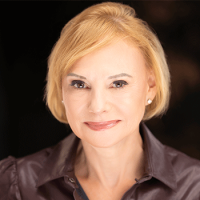Travels in France: Reflections on World War II Heroes and Victims
It was not only the heroism of this country’s brave soldiers that saved the world from Nazism, but the refuge offered by its shores, writes Sherri Goodman.
It was not only the heroism of this country’s brave soldiers that saved the world from Nazism, but the refuge offered by its shores, writes Sherri Goodman.
Traveling in France recently, I paid homage to two great sacrifices that teach us we can never forget the price of freedom in the face of determined and organized aggression: to the allied soldiers who died at Normandy in June 1944 and to my great-grandfather, Samuel Wassermann, a German Jew deported from his home in Mannheim in 1940 to a camp in Nexon where he perished in 1942.
Samuel's only son, Fred, and his only son, George – my father – were fortunate enough to escape Nazi Germany in 1938 and find refuge in the United States. Were it not for a small crack in America's refugee policy in the 1930s, a policy that prevented most Jews from getting into the United States, my entire family might have gone the way of most of Europe's Jews, to the death chambers of Auschwitz, Treblinka, and others.
Samuel and his wife Jenny were not fortunate enough to get visas to the United States before the Nazis deported them in October 1940. Jenny was sent to another French internment camp and died there. Many are surprised to learn that Germany deported some Jews to occupied France. Stripped of their citizenship, they became stateless internees, separated from each other in different camps, where many died of cold, hunger, and thirst. My grandfather used to show me the notice he received from the Red Cross of his parent’s death, and how it pained him that he was unable to rescue them.
It is easier to celebrate our heroes, such as the thousands who died at Normandy, than to continually be reminded of the victims of aggression and oppression. I'm condemned to search for my family's ancestry in small remote towns in France where there is still little recognition of what happened there. A small stone monument next to a forlorn train station is all that marks the deportation of French and European Jews from Nexon to Auschwitz. Another modest marker in the cemetery notes that 59 “Israelites Victimes Du Nazisme” are buried here, including Samuel Wassermann.
We draw strength as a society from celebrating the service and sacrifice of our soldiers and civilians. In Normandy, we celebrate the bravery and courage of our allied soldiers against a determined and fortified Nazi foe. The monumental American cemetery in Normandy solemnly commemorates the lives of thousands in a beautifully manicured and maintained garden that bestows high honor on the lives lost there. I am grateful that America recognizes this service and sacrifice. And it is appropriate that the monument in Nexon recognizes the French resistance fighters as well as Jews who gave their lives to fight Nazi tyranny.
But as we keep the lid on today’s refugees, with some presidential candidates wanting to clamp down even further, we need to remember how proud we are as Americans that have admitted "the tired, the poor, the hungry, and the sick." Our melting pot society draws strength from our diversity, not from believing that those who knock at freedom's door are the "mob at the gates." It was not only the heroism of this country’s brave soldiers that saved the world from Nazism, but the refuge offered by its shores.
I would not be alive today had not America opened its doors in the 1930s to my parents who as Germans were as unwelcome then as are many of today’s refugees from Syria, Iraq, and Somalia. Yet we know that today’s refugees become tomorrow’s leaders and ensure the continuing strength of our nation.
